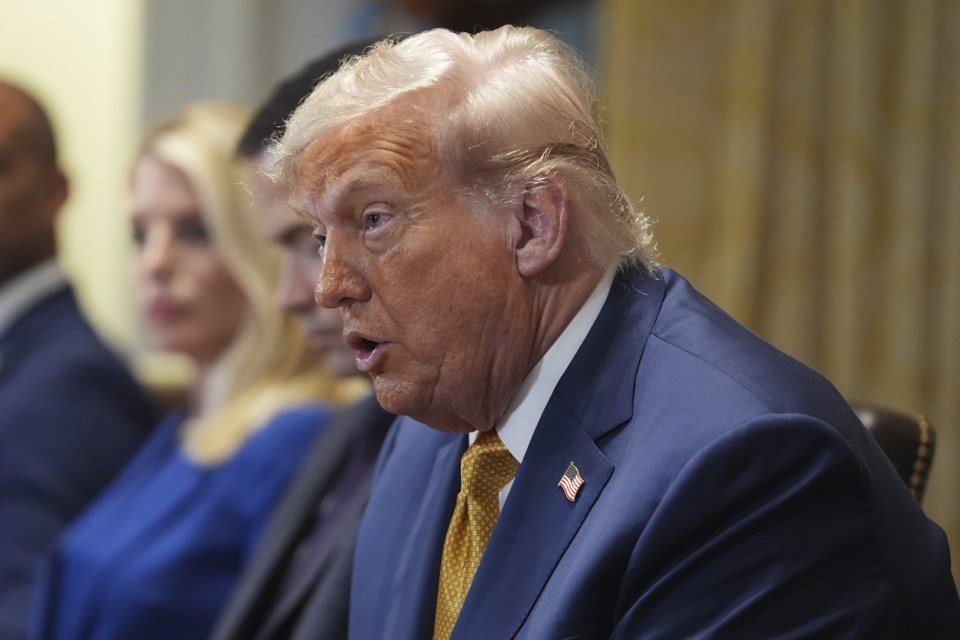WASHINGTON — U.S. President Donald Trump said Tuesday he will impose a 50 per cent tariff on copper imports — but hasn't said yet when it will take effect.
"Today we are doing copper," Trump told reporters at a cabinet meeting. "I believe the tariff on copper, we are going to make it 50 per cent."
The level of tariff was reiterated in the meeting by Commerce Secretary Howard Lutnick. But the president was not scheduled to sign any executive orders Tuesday to implement the duties.
Canadian mining companies wouldn't be especially affected because most raw copper production is exported to Asia, said Pierre Gratton, head of the Mining Association of Canada.
“The copper concentrate that we mine tends to go to other markets, so this is kind of immaterial. It’s disruptive, but it’s immaterial.”
Canadian copper refineries would be more affected, but since the U.S. doesn't have enough domestic capacity, the tariffs would mean passing on more costs to U.S. buyers.
"So once again, President Trump is penalizing the U.S. manufacturing sector, or would be if this goes ahead," said Gratton.
Canadian exports of copper and copper-based products were valued at $9.3 billion in 2023 with just over half going to the U.S., according to Natural Resources Canada. Exports of copper ores and concentrates were valued at $3.4 billion.
Teck Resources Ltd. also noted that it doesn't sell copper concentrates or finished copper into the U.S., while other producers didn't immediately respond to a request for comment.
After Trump's remarks, shares in U.S. mining company Freeport-McMoRan were up 4.6 per cent and the price of copper was up 8.7 per cent to $5.47 per pound.
Markets have seen large swings for months due to Trump's on-and-off efforts to realign global trade through tariffs. The looming copper tariffs are a sign that Trump plans to go ahead with a list of sectoral levies beyond his current import taxes on steel, aluminum and automobiles.
Citing national security concerns, Trump earlier this year launched investigations under Section 232 of the Trade Expansion Act of 1962 into multiple products, including copper and pharmaceuticals.
Trump said he will soon announce duties on pharmaceuticals but suggested he would give manufacturers a year before introducing those tariffs.
"After that, they're going to be tariffed if they have to bring the pharmaceuticals into the country, the drugs and other things, into the country," Trump said. "They’re going to be tariffed at a very, very high rate, like 200 per cent."
The Section 232 tariffs are separate from Trump's massive global tariff regime, which he delayed Monday in order to give his administration more time for trade negotiations.
Devastating U.S. duties against countries around the world were set to come into force Wednesday before Trump pushed back the deadline to Aug. 1.
Canada was not targeted by those global tariffs and has committed to coming up with some sort of bilateral deal with the U.S. by July 21. The Prime Minister's Office said Monday it was still working toward that deadline.
Meanwhile, Canada’s Finance Minister François-Philippe Champagne sent letters to provinces, territories and the Federation of Canadian Municipalities on Tuesday calling on them to support domestic steel and aluminum industries through "strategic procurement policies."
Ottawa last month introduced rules to limit federal procurement to using steel and aluminum from Canada and "reliable trading partners," among other measures.
In Champagne's letter, posted on social media, the minister urged his counterparts in other levels of government to "take meaningful steps to implement similar policies in your jurisdictions."
"A co-ordinated approach across jurisdictions would send a strong signal of unity and reinforce Canada's resolve to secure fair treatment for our businesses and workers," the letter said.
— With files from Ian Bickis in Toronto and The Associated Press
This report by The Canadian Press was first published July 8, 2025.
Kelly Geraldine Malone, The Canadian Press



